Business is business
For Chirdsak Kukiattinun, TFG’s new chief operating officer and director, managing a multi-billion-baht operation is the same whether the products come with shiny bells and whistles or hooves and feathers.
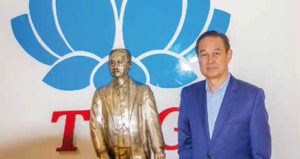
Chirdsak Kukiattinun
Mr Chirdsak, who previously worked for the fast moving telecom and IT industry at a company with an annual sales in excess of 30 billion baht/year, sees a vibrant future at TFG.
Since he took over the top job at TFG in February, he has been tasked with bringing the agro-industrial giant back from the brink of potential insolvency. He’s confident that success is well on track.
“2016 is the beginning of the turnaround,” said Mr Chirdsak.
TFG is already returned in the black due to cost efficiency and more favorable prices for chicken and pork and a growing export business. Gone is the former dismal outlook, and now TFG eyes turnover of 30 billion by 2018, with average growth of 20-25% per annum.
In his view, hi-tech and agro industry have a lot in common. Both are high volume, fast-moving markets with very thin margins and keen competition.
Managing a value chain well, product differentiation, partnerships and capability to handle rapid changes are the keys to survival in both industries, he said.
TFG is now adopting a partnership model in its value chain. The new thinking shifts the business focus from winner- take-all to sharing the wealth that is mutually created.
That means developing the workforce is at the forefront. Successful IT companies give due attention to their people with the goal of creating a favorable working environment and instilling the values of teamwork.
“We are not a player in the commodity market. Our product quality and service is different from our competitors. Expansion of branches upcountry helps customers gain exposure to our products. If consumers are not aware of us today, they may know about us in the future,” he said.
Lean management
Each part of the value chain has been scrutinized to find ways to do a better job. At the same time, staff are collectively setting key performance metrics and goals.
Through teamwork and close collaboration between different departments, TFG’s broiler business was able to avoid losing money in Q1, 2015 despite poor prices.
Though he is new in the industry, he is confident in TFG’s team and their skills, and for this reason, existing TFG staff get the highest priority for promotions and more challenging reassignments. Fillingup the company with new, expensive managers from other organizations is not an option.
The organizational chart has remained intact. TFG has designed a flat and lean organization that seeks to avoid becoming top-heavy with managers. There are no new openings for mid-level or senior managers to fill vacant posts. Replacements can be made only if that position is critical and necessary.
“Our business is labor intensive, not management intensive,” he said.
As a result, there will be more work – but better remuneration and rewards for those willing to earn it.
With the turnaround target in mind, fast and centralized decision-making will continue to some degree. Nevertheless, supervisors and mid-level managers have been assigned additional responsibilities and more decision-making authority, said Mr Chirdsak.
TFG will continue to look for talented people within its own ranks and groom them to move the company forward.
“We hand-pick talented staff and also ask all staff to voluntarily enter our future leader program. We also have an opendoor policy where staff are free to discuss any issues with management anytime,” said Mr Chirdsak.
Reversal of fortune
With this he is confident that TFG will be able to double the size of its business by 2019.
It targets 30 billion baht turnover by 2018, up from 20 billion baht targeted in 2016. To reach that goal, it needs to sustain growth of at least 25% a year.
In Q1, 2016 saw the company turned into 200 million baht profit, TFG’s fortunes continued in Q2 with a net profit of 671 million baht. The rising cost of soft grain commodities was the biggest concern in 2016, he said.
Investment
New investments must complement core competencies and be highly focused based on long term strategies with high returns on equity to protect shareholders.
By and large, a viable project should yield at least a 20% return and break even in less than five years. TFG is open to joint ventures with partners with direct experiences in the specific business too, he added.
The number of branches will rise to 45 units by the end of 2016, up from 13 units in 2015.
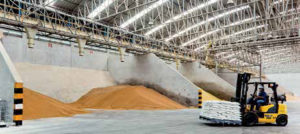
Bunker silo for storing soybean meal, DDGS and more
Swine business
TFG is currently delivering 54,000 finishers/ month, up from 45,000 head/ month in 2015. So far it has maintained very competitive costs. The operation of TFG breeding stock in FMD free in eastern region of Thailand, adds another advantage to fast track swine business expansion, he said.
Primarily, it sells live animals and considers the pork market to be fragmented. It sees an opportunity to venture into hog processing operation.
TFG currently processes 250 hogs/day to supply key accounts around the eastern provinces, modern trade and its outlets across the country.
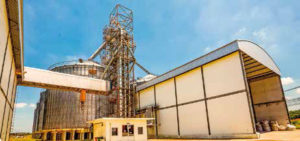
Intake and corn silos
Poultry operation
TFG is poised to invest in a further processing operation. The project estimated to be worth 1.5 billion baht.
Meanwhile, it is working with a Japanese partner – “7 Foods” which has successfully developed markets in Japan.
Its processing plant in Krabinburi has recently raised capacity to 170,000 birds/ day, up from 90,000 to serve markets within 300 km of the plant in the east and northeast of Thailand. Another plant at Kanchanaburi processed over 280,000 birds/day.
It plans to raise processing capacity to 500,000 birds/day by the end of 2016.
The increased output will be achieved by managing the operation more effectively, for example, by increasing year-round rearing.
Breeder farms and hatcheries will need to be expanded in line with the growing market, Mr Chirdsak added.
Automated equipment has been added to the processing line. It has invested over 300 million baht this year to improve automation in the processing plant and raise capacity at its feed operations.
The increasing output will not affect market supply because customers are primarily food services and offshore buyers, he said.
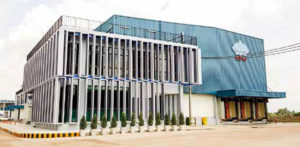
The latest sausage plant worth 380 million baht with 30 tonnes/day capacity
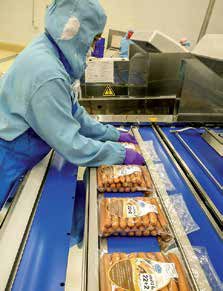
Thai Aroi sausage
A new sausage plant in Krabinburi worth 380 million baht is now up and running, and is expected to churn 30 tonnes/day in Q4. It will supply sausages under “Thai Aroi” brand.
Feed operations
TFG is cranking out 60,000 tonnes/ month at its mill in Suphanburi and 40,000 tonnes/month in
This will boost TFG’s total capacity at the end of 2016 to 100,000 tonnes/month. Some 15% will be sold on the open market.
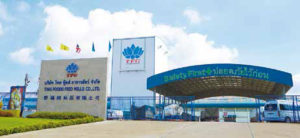
TFG feed mill in Krabinburi
